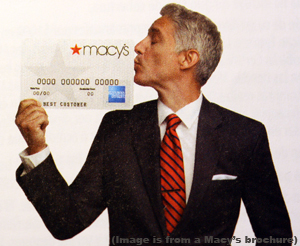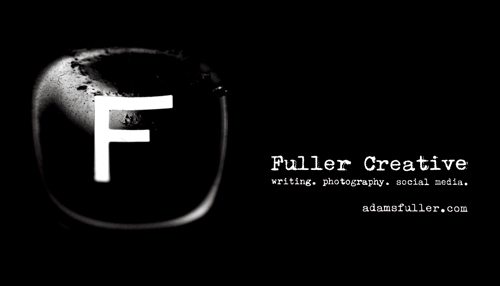Category: 2010
Reflections in Wine and Water
Blinded by the Salesman
Learning to practice the preachings from Blink.
 He has dark, slicked-back hair that looks like it hasn’t moved in three weeks. The faded tone of his black pants doesn’t match that of his black, button-downed shirt. Neither appear to be wrinkled, yet at the same time, neither appear to be ironed or fit quite right. He’s made eye contact with you and is gliding over from across the department store.
He has dark, slicked-back hair that looks like it hasn’t moved in three weeks. The faded tone of his black pants doesn’t match that of his black, button-downed shirt. Neither appear to be wrinkled, yet at the same time, neither appear to be ironed or fit quite right. He’s made eye contact with you and is gliding over from across the department store.
You’re waiting in line at the check-out counter, immobile, arms full of clothes, happy with your selection but uneasy about something. He whisks by you, sets up behind the counter and asks you if you’re all set, in one fast, fluid motion.
You notice that he’s wearing a wedding band and guess that he’s probably pushing 50. The creases on his face say smoker, and where there’s smoke there’s fire: everything inside of you is screaming, “Watch out!”
But, you drown out these warnings and feel yourself pulled by some kind of magnet toward his newly opened register where he scans your items in a blur, sedates you with small talk and finds a way to make his smirk appear to be a smile.
The salesman finishes ringing up the items and congratulates you on taking advantage of so many deals. He says that, yeah, the prices are low, but the value is in the quality of the product. Genius. He complimented your savvy spending habits, corrected the focus of your satisfaction, added value to the transaction and established his own credibility, in one fell swoop.
Now, you’re lame and dazed and limping through the last leg of the purchase. The salesman has you right where he wants you and dives in for the kill.
You have your card on you?
Um, no. I don’t think I have one.
We can check for you. It takes five minutes and you’ll save another 15 percent today.
Are there any fees?
Nothing. Clean. No charges. Type in your social and we’ll check.
Alright.
The voice in your head is whispering that giving out your social security number shouldn’t be done so frivolously, but he quells that fear by showing you that he doesn’t see any of the numbers and they only show as X’s on his screen.
You’re still uneasy, but now you just want this to be over. He assures you there is no risk, that you can cancel the card anytime and as long as there is no balance, there won’t be a fee. Smoke, mirrors, flashing lights, shiny objects. Next thing you know you have applied for and been approved for a new American Express card, when you thought you were signing up for a store membership club card.
You’ve been sold and it tastes rotten.
What’s worse is that your poor decision wasn’t out of stupidity or confusion. It was ignorance. You didn’t know that you were signing up for a credit card, but you did know that something wasn’t right. Your adaptive unconscious was throwing up red flags every step of the way: the immediate feeling of distrust; the shyster profile; the social security number unease; the confusion; the scent of an impulse transaction at the point-of-purchase.
You are much smarter than you think. You knew better, and should have listened to yourself, but more importantly, to your gut.
I recently read the book “Blink” by Malcolm Gladwell and was captivated by the studies, stories and examples that speak on “The Power of Thinking Without Thinking.” No more than a week after I finished the book, with the values of “Blink” still fresh in my head, did I experience the story you just read, during a shopping excursion at a department store.
In this story, I was the sucker, and was kicking myself the whole way home for being such an idiot. Even though it’s probably not the end of the world, and my credit score should be alright, it was poor judgement. And, as mad as I am for letting myself get duped, I am even more fascinated by “Blink,” and how the lessons can apply to nearly every aspect of your life. They reveal themselves when you least expect them and stick with you far down the road. All we have to do is listen, and learn.
Business Card Design: Diagonal Type
4 Takeaways from the Steven Slater Exit
JetBlue flight attendant, Steven Slater quit his job after an apparently heated exchange with a disobedient passenger. Reports say that when the plane was taxiing to the gate, he yelled at the passenger over the intercom, grabbed two beers out of the drink cart, opened the emergency exit and slid down the slide, onto the tarmac, out of a job and into Internet stardom. (Full story here.) In the days since the incident, Slater has dominated the headlines and has become somewhat of a folk hero. After all, who hasn’t wanted to put a jerk in his place or quit a job with a splash?
But, before you start planning your escape, there are a few things about this incident that you should keep in mind.
JetBlue gets it
A rogue employee, swearing at a customer is not exactly the image a company wants to present to the public. However, JetBlue, so far, has handled the volatile situation commendably. They’ve remained actively engaged with customers on social media, built upon a pre-existing solid brand image foundation and addressed the situation with a genius post on their company blog. Note in the post how JetBlue used this opportunity to spin the situation by using it as an opportunity to thank and acknowledge their employees. It not only served to boost morale internally, but also told customers that they don’t have to worry about flight attendants flipping out. In effect, “one loose cannon out of over 2,000 straight arrows ain’t bad.” Major props to the JetBlue PR team.
Context counts
This iconic “I quit” didn’t just happen out of nowhere. The allegedly unruly passenger has been the main focus, however, we also need to factor in that Slater reportedly was under a lot of stress at the time: his mother is dying from lung cancer, his father died of Lou Gehrig’s disease and he’s had issues in the past with alcohol and substance abuse. These may not be excuses for blowing up, but they are reminders that often, actions are caused by many contextual issues that can tip things from beneath the surface. Read “Tipping Point” by Malcolm Gladwell for more on this concept.
Scarface is still the coolest quitter
Inevitably, media coverage of this story has resulted in references to famous quitting scenes on the big screen. The obvious scenes from Jerry McGuire and Office Space made the rounds, but Scarface’s “I-quit” scene remains my favorite. (Don’t click this last link if you can’t stand F-bombs.)
Never burn bridges
Yeah we’ve all had fantasies of setting fire to the sinking ship, but if this was your employee would you hire Slater back? Facebook pages, blogs and websites have been created to urge JetBlue to forgive and forget. But even if you love what he did, can you blame a company for not wanting to have an employee with this on their record? Furthermore, his position is on the front lines, representing their company and interacting with valued customers. I wouldn’t. You’ve got to be able to keep your cool, whether you’re on the ground or flying at 30,000 feet.
Would you hire him?




